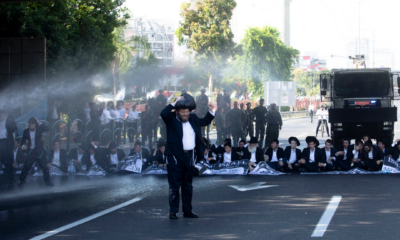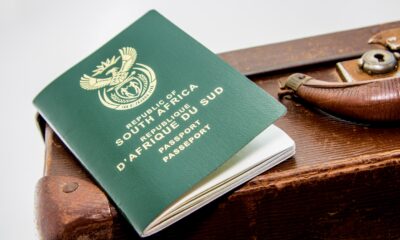
OpEds

Pandor’s threat to SA soldiers in IDF not credible
Foreign Minister Dr Naledi Pandor recently threatened South African citizens serving in the Israel Defense Forces (IDF), telling a Palestinian solidarity event, “I’ve already issued a statement alerting those who are South African and who are fighting alongside or in the Israel Defense Forces: we’re ready, when you come home, we’ll arrest you.”
But though Pandor may help determine foreign policy, she has no power to create criminal liability within South Africa. In fact, there’s no “law on the books” that the South African government could use to prosecute a citizen for enlisting in a foreign military.
A recent article by Michelle Nel in the SA Jewish Report (“South Africans fighting for Israel in Gaza: what does the law say”, 4 April 2024) presented a differing viewpoint. Nel referenced the two relevant pieces of legislation, first, the Regulation of Foreign Military Assistance Act, 1998, and second, the Prohibition of Mercenary Activities and Regulation of Certain Activities in Country of Armed Conflict Act, 2006. The 2006 Act, while it was passed and formally enacted in 2006/2007, only “comes into operation on a date determined by the president by proclamation in the Gazette”. (See s16.) Once it does, it will replace the 1998 Act. (See s14.) This hasn’t yet happened, which means South African law is based on the 1998 Act.
“Enlisting in a foreign army” without permission, is explicitly prohibited by the yet-to-be-promulgated 2006 Act, but not the 1998 Act. The latter prohibits only unapproved “military assistance” like “financial, logistical, intelligence, or operational support” services; “recruitment” services; “procurement of equipment” services; or “mercenary services”, which is defined as fighting for profit.
The core concern might be that the South African government would try to read “enlisting in a foreign army” in the 1998 Act’s catch-all provision which prohibits any unapproved “action that has the result of furthering the military interests of a party to the armed conflict”. This may seem like a plausible proposition, and it’s the one adopted by Nel – after all, enlisting in an army furthers the military interests of the relevant country. However, any attempt by the government to squeeze “enlisting in a foreign army” into this general provision will fail for three independent reasons of increasing force.
First, the 1998 Act is clearly concerned with regulating actions of a transactional or for-profit nature, and the relevant activities are explicitly mentioned. If the government wanted to prohibit such a major action like enlistment, it would need to mention this explicitly. It does this, for example, with mercenary activity, which is defined as “participation in an armed conflict for private gain”, yet no similar prohibition exists for fighting out of duty or national obligation, in other words, not-for gain. It’s noteworthy that there’s no evidence of any South African having been arrested let alone successfully prosecuted for enlisting in a foreign army. However, thousands of South Africans have been fighting in foreign armies, including the Israeli and British armies, every year since the legislation was introduced.
Second, the fact that the 1998 Act doesn’t prohibit enlisting in a foreign army was explicitly recognised in the Parliamentary Bill that established the 2006 Act. The Bill states that the purpose of the new 2006 Act is “to amend the Regulation of Foreign Military Assistance Act, 1998, so as to provide for the regulation of enlistment of South African citizens with foreign armed forces”. In other words, enlistment in a foreign army wasn’t regulated under the 1998 Act, and that was one of main purposes of the 2006 Act.
Third, the 2006 Act states that “a citizen of the Republic or a person ordinarily resident in the Republic who, at the time of the commencement of this Act, had already been enlisted in an armed force, must within six months of the date of the commencement of this Act, apply for authorisation”. In other words, while it was legal to enlist in a foreign army before the 2006 Act came into operation, soldiers have six months to get authorised once the Act is promulgated.
That’s case closed.
Note when the 2006 Act is finally promulgated, it will raise serious constitutional issues. In 2010, the United Nations Human Rights Council published a detailed review of the 2006 Act and explicitly focused on the new enlistment prohibition. The report notes that “1 000 South Africans are presently enlisted in the British army” and highlights various challenges which the Act will probably face on constitutional grounds. Nel pointed to section 198(b) of the Constitution, which states that “the resolve to live in peace and harmony precludes any South African citizen from participating in armed conflict, nationally or internationally, except as provided for in terms of the Constitution or national legislation”. This principle sets up a weighting where various rights and considerations will need to be balanced.
Is it permissible under the Constitution for the state to prohibit a dual citizen from serving in the army of another nation to which they also hold citizenship? Recall that South African courts recently overturned the ability of the government to withdraw citizenship from persons who had acquired citizenship in another country. The courts may be equally suspect of the government’s power to reach into another country and stop a citizen of that country from fulfilling their national duties, including the duty to serve. These tricky constitutional problems probably play no small part in the government’s reticence to promulgate the 2006 Act.
But, regardless of how the Constitution is interpreted, one cannot be arrested for violating a principle of the Constitution. To criminally prosecute a citizen, the state requires legislation that specifically criminalises the relevant activity. With the near certainty that the courts would find that the 1998 Act doesn’t prohibit enlisting in a foreign army, it would be a fool’s errand to bring a case against IDF soldiers, and the government is highly unlikely to do so.
Pandor may be pandering to her audience, but her threats of arresting South Africans fighting in the IDF aren’t credible. South African citizens enlisted in the IDF can find significant comfort that not only are they on the right side of history, they are also on the right side of the law back in South Africa.
- Robert Lipschitz is a professional economist who regularly works in competition law and economics. He’s not a lawyer, and this doesn’t constitute a professional legal opinion.











SIMON ARCUS
April 11, 2024 at 1:51 pm
In a world of hysteria and fear, you’ve presented the facts, so well. Political grandstanding as well as a lack of knowledge, baked with anti Jewish/Israel/Zionism should be called out as a matter of urgency. Thanks
Shaun
May 30, 2024 at 11:14 pm
Actually Pandor should be charged and arrested for anti- Semitism.